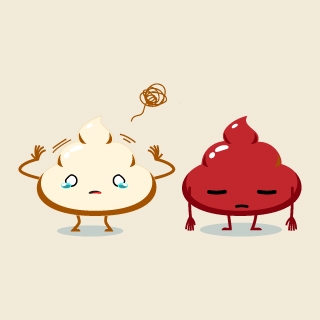Let’s face it, what goes in eventually comes out. Given our body is essentially one large processing machine for all the food that we consume, it is easy to see the connection between our poop colour and digestive health.
But before we even begin analysing our poop colour in relation to our digestive system, let’s first establish what should normal stool colour look like.
_business.jpg)

All shades of brown are considered the normal business for your big business
but every now and then, nature’s call can yield some pretty colourful results.

Sometimes you may rise from the toilet bowl to be greeted with some green poop. This might be quite concerning to look at, but if your diet consists of a healthy and generous amount of spinach, kale, and other green foods and vegetables, then this should be a normal phenomenon and you can be congratulated for your healthy diet.
However, if your diet is largely absent of said green vegetables, green stool is a sign that there may be too much bile secreted from your liver cells or in the case of green diarrhoea, it could be that your food moved through the gut too quickly, so the bile pigment didn’t time to turn brown.

There may also be occasions when your poop appears to be yellow or golden in colour. This is not a sign of good wealth, but rather it means that your stools contain too much fat. This could be a result of fat absorption issues or a sign that the body is experiencing difficulty producing enzymes or bile.
Having yellow poop every now and then is not something to be overly concerned about. But if this issue last longer than 2 weeks, then a trip to the doctor should definitely be at the top of your to-do list.

Then there’s black stool, which definitely looks ominous especially since they have the appearance of tar. Unless your diet consists of a lot of iron supplements, black liquorice, or bismuth medications, black poop is a strong sign that there may be gastrointestinal bleeding in your digestive system, which of course, should be diagnosed by your clinical physician.

Of course! We also have the rarer novelty instances of poop variety, which are the white and red poops. If the passage of your motions results in white stools, it does not mean that you have a really clean digestive system.
Instead, you may be suffering from liver or gallbladder issues since this is caused by a lack of bile. Some anti-diarrhoea medications can also cause white stools. So, if this is a persistent issue, please seek immediate medical assistance.
Scariest of the lot, red-coloured poop may be the result of lower gastrointestinal bleeding since the small amount of blood in the stools can indicate haemorrhoids. While there are foods like beets, red berries, or tomato juice that turn one’s stools red, your poop should quickly become brown again once they pass through the digestive tract. So again, if it persists, then a check-up with your physician is in order.
While talking about poop can be funny, abnormal poop colour is a serious matter and should be monitored closely. While we’ve seen that there are certain foods that can change the shades and hues of our poop, we still need to pay attention and face our stools to gauge the condition of our digestive system so that we might live to poop another day.
Get all the tools you need for a healthy gut with the new BodyKey Gut Reset Weight ManagementProgramme. This programme breaks through your weight management barriers by helping you reset and rebalance your body's natural mechanism, build positive habits and live a healthier, happier life.
Here’s what you can potentially gain from the programme: